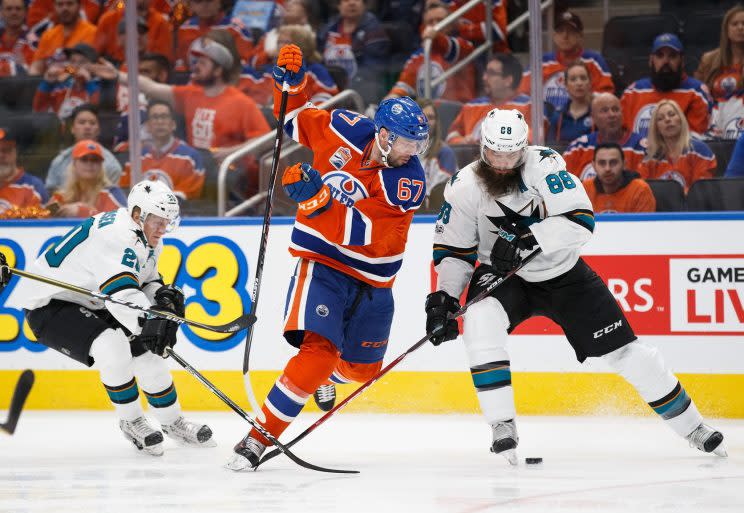Edmonton Oilers must beat Brent Burns if they hope to beat the San Jose Sharks
Entering the series between the San Jose Sharks and Edmonton Oilers, Connor McDavid looked like the impact player who might be unstoppable. With Logan Couture playing hurt and Joe Thornton not playing at all, the men in teal looked to be in real trouble in matchup situations against the NHL’s highest-scoring centre.
Instead, it turned out that the player nobody had an answer for was San Jose defenceman Brent Burns.
At first glance, that may seem like an odd statement. Burns didn’t pick up a point against the Oilers. He did fire the puck an incredible 18 times, thanks in large part because the Sharks spent so much time on the power play, but then San Jose only notched one power play goal on six tries.
Moreover, as Tyler Dellow of The Athletic has pointed out, an overreliance on Burns’ point shot actually may be part of the problem with San Jose’s power play this year:
SJS PP1 in 2014-15 v. SJS PP1 in 2016-17. pic.twitter.com/WilgfPMili
— dellowhockey (@dellowhockey) April 13, 2017
Those charts above compare the successful power play of the Sharks two years ago (on right) with the current, less successful edition (on left). The key difference is that the modern power play gets a lot of point shots and far fewer chances from in-close, a sure-fire recipe for losing goals. That’s a strategy issue rather than a Burns issue, but it does make it more difficult to laud his power play-driven shot totals.
Instead, we’re going to focus on the way the game changed when Burns stepped out on the ice.
In the opening period, where Edmonton carved out their 2-0 lead, the Oilers controlled the balance of play. They held a 14-9 edge in shot attempts at even-strength, and a 7-5 edge in scoring chances (as defined by Natural Stat Trick). Then everything came unglued.
Over the last two periods and the overtime, San Jose had a 45-17 edge in shot attempts at 5-on-5. The count by scoring chances was 26-6. NBC’s Mike Johnson described the Oilers as “almost lucky” to survive to overtime after Edmonton went the final 17:31 of the third without managing a single shot. He was right, and the luck didn’t last.
That brings us back to Burns, who was the catalyst for so much of that pressure the Sharks poured on over the final two-thirds of the game.

Burns and his always reliable defence partner Paul Martin fared well against every Oilers line. They mostly matched up against the Ryan Nugent-Hopkins-centered second unit, but they faced a little bit of everyone. In a couple of rare shifts against McDavid (who mostly saw Marc-Edouard Vlasic), Burns and Martin even managed to keep Edmonton’s top line pinned in its own zone.
Todd McLellan, the former Sharks and current Oilers coach, knows precisely how dangerous Burns can be, and it seemed like Edmonton made a special effort to play physically against him. Burns and Iiro Pakarinen got into an extended tussle which was passed over by the officials. Shortly thereafter Zack Kassian landed a heavy hit on the Sharks’ defenceman, though because Burns had time prepare for impact, identifying which player got the worst of the hit is somewhat debatable.
Undoubtedly, the physicality against Burns is going to continue, but it wasn’t enough in Game 1. Burns was able to consistently advance the puck out of his end, whether by skating it himself or through an outlet pass. He also did a good job of preventing the Oilers from exiting their own zone or breaking into the San Jose side of the rink.
That combination of strength, reach, mobility and confidence with the puck makes him a superb puck possession player. In one memorable sequence late in the first period, he picked the pocket of Milan Lucic in Edmonton’s own zone and had several seconds by himself in front of the net with the puck. Somehow, Cam Talbot held him off.

Yet Burns isn’t perfect. The league’s official scorers credited him with three turnovers, which in some ways is just the cost of doing business for a puckmoving defenceman but also suggests he can be pressured into making high-risk decisions.
Benoit Pouliot, who has had a bad season but can still skate like few others, forced Burns into a tripping penalty early in the second period by changing direction quickly as he attacked. McDavid, who is even faster, generated a good opportunity (he fired just wide) by cutting around Burns at full flight. Hitting Burns is good, if the opportunity is available, but speed is just as important. Forcing Burns to make quick decisions is a decent method for creating turnovers, no matter how gifted the foe.
Edmonton just didn’t do enough of that in this initial encounter with the Sharks. Grinding Burns down is impossible without constant offensive zone pressure. If the Oilers can’t exit their own end with speed, forcing Burns and his teammates to back off, they’re going to repeat that unpleasant Game 1 experience later on in this series.


